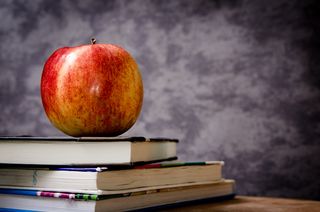
Stress
Happy New Year! (For Students, at Least)
Three strategies to prevent stress as we head into the new school year
Posted September 5, 2016

I think that, for students, not even the ball drop in Times Square or renditions of Auld Lang Syne signify new beginnings quite like the start of September. Along with the chillier weather, that back-to-school buzz is in the air, and, whether we’re ready or not, student orientations, meetings with supervisors, course outlines, and penciled-in due dates are on the near horizon.
Needless to say, although this time of year is often coupled with excitement, new goals, and fresh starts (and, of course, pumpkin spice lattes), it can also feel overwhelming for students. In fact, Dundas and her colleagues (2016) claimed that, “there is growing concern about the impact of stress and mental health problems among students in higher education” (p. 114). Also troublingly, Bland et al. (2012) found that university students often use maladaptive coping strategies and lifestyle habits that can actually exacerbate academic stress. It seems that students could be well-served by strategies to help them cope more effectively with the stresses of September and beyond – below are a few to get started:
Organize
Let’s face it: some of us are natural organizers and some of us just frankly aren’t. However, getting organized for the school year doesn’t have to mean perfectly color-coded lists and complicated filing systems – it may just mean a bit of tidiness and a bit of planning.
I recommend Marie Kondo’s bestselling book, The Life-Changing Magic of Tidying Up, which outlines her unique, joy-based organizational method. In a nutshell, Kondo advocates for: keeping the things that bring us joy (and letting go of the rest), approaching organization from a positive viewpoint, and just getting started (think about all that precious time we waste just thinking about getting organized!). Kondo’s de-cluttering mentality is onto something: a study in the Journal of Neuroscience confirms that looking at too many things at once is distracting (think: disorderly desktop) and interferes with the brain’s ability to process information efficiently – certainly not a state of mind that stimulates studying or writing.
Furthermore, a bit of planning goes a long way. One of the most helpful practices I’ve adopted, and which has lessened the everyday stress in my life, is writing out meal plans for the week and shopping accordingly. Nothing is worse than coming home at the end of a long day with nothing in the fridge – this not only promotes eating out (which isn’t always great for your health or your wallet), it also creates a frenzied atmosphere during the time of day when we’re ready to relax and unwind. Take some time to reflect upon the areas in your life that would benefit from some preparation – if you tend to procrastinate, that could mean creating a study schedule; or, if you tend to overwork yourself, that could mean planning ahead (and sticking to) some quality self-care time.
Minimize Multitasking
I’ll admit it: with one browser window open to Expedia and another to Google Scholar, I was just attempting to “multitask” my vacation-booking alongside my research for this blog post – albeit rather unsuccessfully. While my Expedia booking kept timing out, my mind would take a few minutes to re-focus on strategies for students as I attempted to jump back and forth. When I saw the articles referenced below on multitasking, I knew it was time to practice what I preach and bookmark the vacation-dreaming for later.
Some multitasking can be done effectively – answering emails while waiting in line at the grocery store is a pretty straightforward endeavor. However, our ability to engage in more than one complex task at once may be harmful not only for productivity, but also for our brains. In 2001, researchers at the University of Michigan found that people lose both speed and accuracy when switching between tasks. Furthermore, a study published in 2014 found that people who frequently used several media devices at the same time (like mobile phones and laptops) actually had lower grey-matter density in certain areas of their brains (Loh & Kanai, 2014). This research adds to the body of literature that has found media multi-tasking to be associated with depression, social anxiety, and even poor academic performance (Becker et al., 2013; Junco & Cotton, 2010).
Although attending to several things at once is just realistically part of grad school life, make sure you allow yourself enough time to complete each small task rather than jumping haphazardly from thing to thing. And when you’re on one device, put the other one (or two) away (For some support, check out these 10 online tools that can help with attention and focus)
Practice Self-compassion
Self-compassion involves being kind to ourselves rather than critical, embracing our experiences as part of the larger human experience, and being aware of our difficult thoughts and feelings without feeling completely consumed by them (Neff, 2011). It involves the awareness that, although we are often our own worst critics, we are deserving of compassion and understanding – even (and, perhaps, especially) if you bombed that big exam or didn’t get the feedback you were hoping for.
Self-compassion appears to be important in supporting psychological wellness for university students; self-compassionate students have reported lower levels of depression (Terry, Leary, & Mehta, 2013), less fear of failure, and greater intrinsic motivation (Neff, Hsieh, & Dejitterat, 2005). In a study published this year, the authors found that higher levels of self-compassion partially mediated the relationship between maladaptive perfectionism and depressive symptoms (Mehr & Adams, 2016). This is important, given that (not surprisingly) perfectionism tends to be a salient concern amongst university students.
It is often easier to act compassionately towards others than towards our own selves. Thus, to practice self-compassion, it can be helpful to imagine what we would say to a good friend in a similar situation, and apply the answer to ourselves.
References
Becker, M. W., Alzahabi, R., Hopwood, C. J. (2013). Media multitasking is associated with symptoms of depression and social anxiety. Cyberpsychology, Behavior and Social Networking, 16, 132–135. doi: 10.1089/cyber.2012.0291
Bland, H. W., Melton, B. F., Welle, P., & Bigham, L. (2012). Stress tolerance: New challenges for millennial college students. College Student Journal, 46(2), 362–375.
Dundas, I., Thorshein, T., Hjeltnes, A., & Einar Binder, P. (2016). Mindfulness based stress reduction for academic evaluation anxiety: A naturalistic longitudinal study. Journal of College Student Psychotherapy, 30(2), 114-131.
Junco R., Cotton, S. R. (2010). Perceived academic effects of instant messaging use. Computers and Education, 56, 370–378. doi: 10.1016/j.compedu.2010.08.020
Mehr, K. E., & Adams, A. C. (2016). Self-compassion as a mediator of maladaptive perfectionism and depressive symptoms in college students. Journal of College Student Psychotherapy, 30(2), 132-145.
Neff, K. D. (2011). Self-compassion: Stop beating yourself up and leave insecurity behind. New York, NY: HarperCollins Publishers.
Neff, K. D., Hsieh, Y., & Dejitterat, K. (2005). Self-compassion, achievement goals, and coping with academic failure. Self and Identity, 4, 263–287.
Terry, M. L., Leary, M. R., & Mehta, S. (2013). Self-compassion as a buffer against homesickness, depression, and dissatisfaction in the transition to college. Self and Identity, 12, 278–290.



